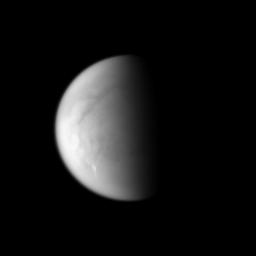Streaking Through the South
Caption:
Cloud streaks stand out on Saturn's largest moon, Titan.
The tropospheric clouds seen in the lower left of the image are located at 45 to 55 degrees south latitude on Titan, and the streaks of the clouds are oriented east-west. This view looks toward the south pole of Titan. The pole lies near the terminator about a quarter of the way inward from the planet's limb at the bottom of this image.
For a movie of tropospheric cloud activity near Titan's south pole, see PIA06124.
Lit terrain seen here is on the leading hemisphere of Titan (5150 kilometers, or 3200 miles across). The image was taken with the Cassini spacecraft narrow-angle camera on March 24, 2009 using a spectral filter sensitive to wavelengths of near-infrared light centered at 938 nanometers. The view was obtained at a distance of approximately 1.1 million kilometers (684,000 miles) from Titan and at a Sun-Titan-spacecraft, or phase, angle of 78 degrees. Image scale is 7 kilometers (4 miles) per pixel.
Background Info:
The Cassini-Huygens mission is a cooperative project of NASA, the European Space Agency and the Italian Space Agency. The Jet Propulsion Laboratory, a division of the California Institute of Technology in Pasadena, manages the mission for NASA's Science Mission Directorate, Washington, D.C. The Cassini orbiter and its two onboard cameras were designed, developed and assembled at JPL. The imaging operations center is based at the Space Science Institute in Boulder, Colo.
For more information about the Cassini-Huygens mission visit
http://saturn.jpl.nasa.gov/
. The Cassini imaging team homepage is at
http://ciclops.org
.
Cataloging Keywords:
| Name |
Value |
Additional Values |
| Target |
Titan |
|
| System |
Saturn |
|
| Target Type |
Satellite |
|
| Mission |
Cassini-Huygens |
|
| Instrument Host |
Cassini Orbiter |
|
| Host Type |
Orbiter |
|
| Instrument |
Imaging Science Subsystem (ISS) |
|
| Detector |
Narrow Angle Camera |
|
| Extra Keywords |
Grayscale, Infrared, Visual |
| Acquisition Date |
|
| Release Date |
2009-05-27 |
| Date in Caption |
2009-03-24 |
|
| Image Credit |
NASA/JPL/Space Science Institute |
| Source |
photojournal.jpl.nasa.gov/catalog/PIA11501 |
| Identifier |
PIA11501 |

 Planetary Data System
Planetary Data System
